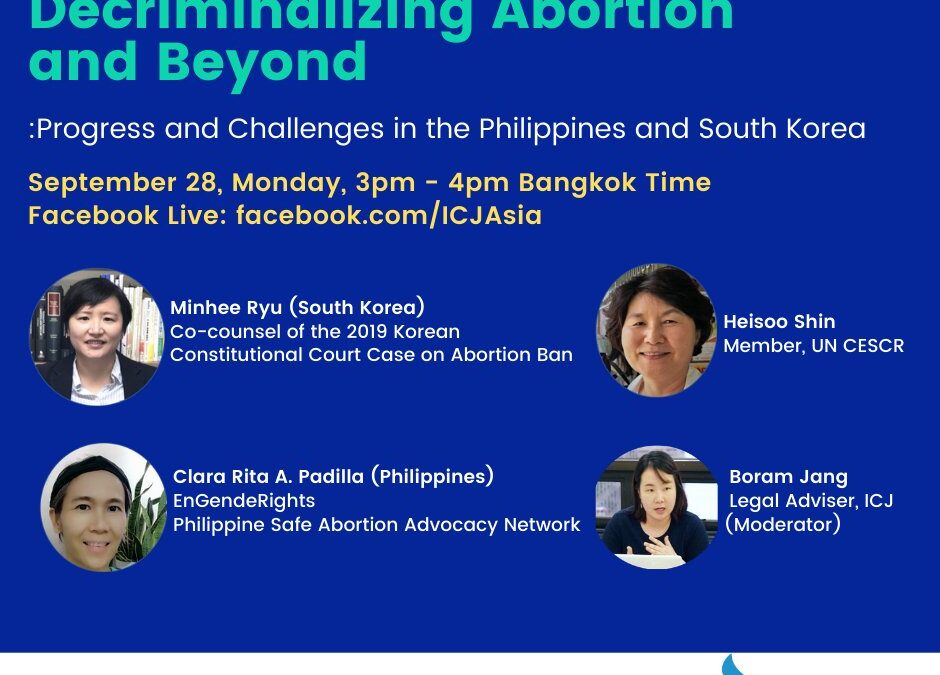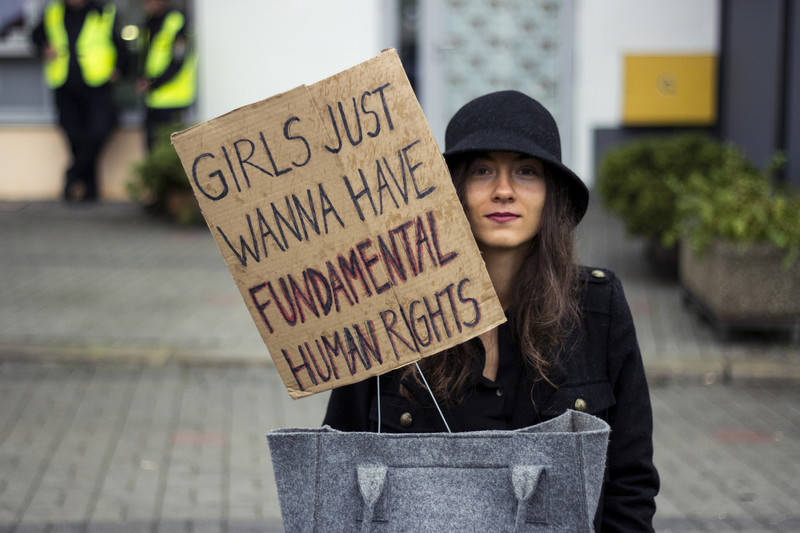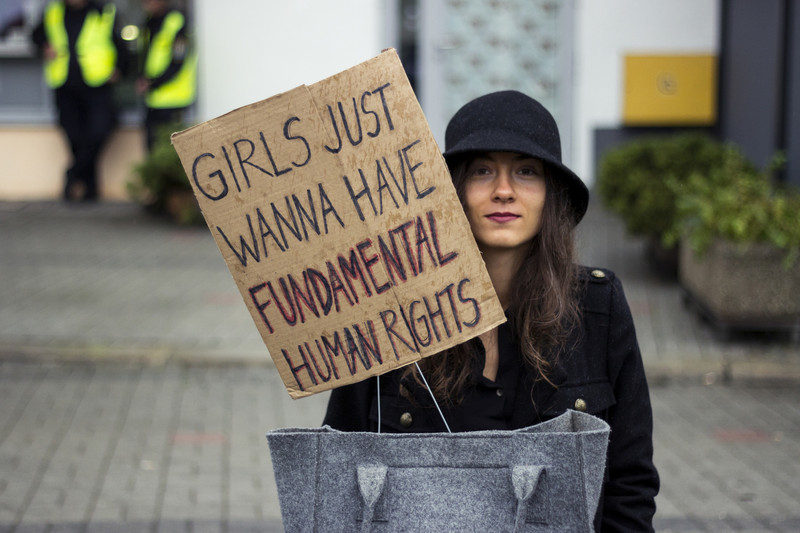
Apr 26, 2022 | News
Yesterday, the International Commission of Jurists (ICJ) hosted a live Facebook discussion with ICJ Commissioner, Justice Qinisile Mabuza (Eswatini), to discuss access to abortion care in Eswatini. The conversation focused on Swazi women’s reproductive health rights and the path to legalizing abortion in the country.

Sep 29, 2020 | Advocacy, News
On the International Safe Abortion Day, the ICJ held a webinar on the decriminalization of abortion in the Philippines and the Republic of Korea.
The webinar focused on the legal provisions criminalizing abortion and on women human rights defenders’ struggle to decriminalize abortion in the Philippines and in the Republic of Korea. In addition, the participants highlighted States’ legal obligation to guarantee access to legal, safe and affordable abortion and post abortion care for all persons under international human rights law and standards.
Ms. Clara Rita A. Padilla from the Philippines’ Safe Abortion Advocacy Network; Ms. Minhee Ryu, Co-counsel in the 2019 Korean Constitutional Court case on the country’s criminal ban on abortion; and Dr. Heisoo Shin, member of the UN Committee on Economic, Social and Cultural Rights (CESCR) participated as speakers.
“The law imposing penalties on women who have an abortion and those assisting them only endangered the lives of women forced to seek unsafe abortion,” said Ms. Padilla. “Today, the Philippine Safe Abortion Advocacy Network introduced a draft bill, An Act Decriminalizing Induced Abortion to Save the Lives of Women, Girls, and Persons of Diverse Gender Identities, and we will continue advocating the repeal of the current discriminatory law against women and eliminate harmful stigma against women due to the restrictive abortion law and imposition of judgmental religious beliefs.”
Ms. Minhee Ryu talked about the women human rights defender’s movement in the Republic of Korea, including the work of the Joint Action for Reproductive Justice. She also highlighted the legal strategy to draw the Constitutional Court’s attention to the experience of girls, migrant women and women with disabilities in the context of the case that resulted in the Court holding that the criminalization of abortion was unconstitutional in April 2019.
“It is the core obligations of States to ensure the repeal of laws, policies and practices that criminalize, obstruct or undermine access by individuals or a particular group to sexual and reproductive health facilities and services,” said Dr. Heisoo Shin. “Denial of abortion often leads to maternal mortality and morbidity, which, in turn, constitute violations of the rights to life, dignity, autonomy, security, equality and non-discrimination, equality before the law and equal protection of the law without discrimination, privacy, physical and mental health, and the right to freedom from ill-treatment.”
The participants agreed that international human rights law and standards, such as the Human Rights Committee’s General Comment 36 on the right to life, and the CESCR’s General Comment 22 on the right to sexual and reproductive health, are instrumental in worldwide efforts to ensure access to legal, safe and affordable abortion and in advocating for its complete decriminalization.
Contact
Boram Jang, International Legal Adviser, e: boram.jang(a)icj.org

Apr 14, 2020 | Advocacy, News
The ICJ and 108 other organizations are deeply concerned by relentless attempts to roll back sexual and reproductive rights in Poland.
On 15 and 16 April Poland’s Parliament will again debate two draft bills that would severely limit access to safe abortion care and would criminalize the provision of sexuality education.
If enacted into law these bills would place women’s and adolescents’ health and well-being at risk and violate Poland’s international human rights obligations.
Full statement, in PDF: Poland-COVID-19 Abortion bill-Advocacy-2020-ENG)

Apr 9, 2020 | Advocacy, News
A joint statement signed by the ICJ and 102 other organizations.
The COVID-19 pandemic and public health crisis is presenting grave challenges for health care systems across Europe.
As European countries work to address the pandemic, protect their populations, and meet the increased demand on health care workers and health care facilities it is vital that they adopt measures to safeguard the health, human dignity, physical and mental integrity, and reproductive autonomy of women and girls in the region.
In many countries the lack of government measures to guarantee individuals’ safe and timely access to essential sexual and reproductive health services, goods, and information during the pandemic is of particular concern.
Women and girls – this statement refers to women and girls, as the majority of individuals who are needing abortion care identify as such but it equally applies to all individuals who may become pregnant and need abortion care or other sexual and reproductive health care – are facing significant restrictions in safely accessing essential sexual and reproductive health services, particularly timely abortion care, post abortion care, and emergency contraception.
Such restrictions disproportionately impact individuals belonging to marginalized groups, including women living in poverty, women with disabilities, Roma women, undocumented migrant women, adolescents, and women at risk or who are survivors of domestic and sexual violence.
These restrictions also create unnecessary risks of exposure to COVID-19 for women and girls and their families as well as for health care providers.
Particularly grave barriers are arising for women and girls living in European countries where abortion care is illegal or severely restricted, and where as a result they must travel to other countries to access legal care or must obtain abortion medication from outside their own jurisdiction.
These issues can also arise in those European countries where individuals are forced to go through burdensome or harmful administrative processes to access abortion care or where they may have difficulty finding doctors in their country willing to provide care.
We applaud those governments that have moved swiftly to safeguard access to essential time- sensitive sexual and reproductive health care during this time, in particular through ensuring access to telehealth and early medical abortion from home.
We call on all other European governments to follow suit and to follow the guidance of medical and public health experts.
We call on the six European countries (Andorra, Liechtenstein, Malta, Monaco, Poland and San Marino) where abortion is illegal or severely restricted to urgently reform these laws, which place women’s health and lives at risk.
Limitations on travel and transport now compound the impact of these highly restrictive laws. Individuals in these countries may no longer be able to travel abroad or to obtain medication for abortion sent by post from medical providers in other countries. As a result, they face heightened risks to their health and wellbeing.
We call on those countries where abortion is legal but where clinical services are unavailable or difficult to access due to a range of barriers, including medically unnecessary requirements that oblige individuals to take multiple or unneeded trips to health care facilities or undergo mandatory hospitalization, to urgently eradicate those barriers and ensure access to services.
Urgent steps should also be taken to ensure that refusals of care because of private beliefs by doctors do not jeopardize timely access to legal abortion care.
In accordance with human rights obligations3 and the recommendations of medical experts4 the following measures should be adopted, and at a minimum remain in place for the duration of the COVID-19 pandemic:
- Ensure that abortion is treated as essential and time-sensitive health care and guarantee access to care in a timely manner.
- Authorize and make available in a timely manner telehealth consultations for anyone who is seeking abortion care or information. Specific measures should be adopted to ensure that telehealth consultations are free or low cost and easily accessible for marginalized groups.
- Guarantee timely access to early medical abortion throughout each jurisdiction and allow doctors to prescribe the necessary medication via telehealth consultation.
- Allow individuals to take all abortion medication at home. Requirements in some European countries that one pill must be taken in the physical presence of a doctor or in a health care facility should be removed.
- Remove mandatory waiting periods prior to abortion as well as mandatory counselling requirements or ensure counselling can be conducted through telehealth consultation.
- Authorize primary care doctors and midwives to provide early medical abortion.
- Adopt health system safeguards to guarantee access to care in cases where early medical abortion is not possible or is contraindicated, for individuals who need abortion care later in pregnancy or post-abortion care, or who may need to visit a health care facility for other reasons. Travel in such cases should be deemed essential and permitted even where governments have otherwise restricted free movement.
- Where a doctor’s authorization is required, this should be limited to one doctor. Requirements for multiple doctors’ approval of an abortion should be removed.
- Guarantee timely access to prenatal testing and psychosocial support where requested.
- Guarantee an adequate number of providers willing and able to provide abortion care throughout the country and widely publicize information on how women can identify health care professionals willing and available to provide abortion care. Urgently ensure that refusals of care by doctors do not jeopardize access to abortion care in a time of crisis.
- Widely disseminate information on those changes to SRHR policies and health care services that are being made in the context of COVID-19 responses.
- Ensure access to contraception including emergency contraception, including through authorizing telehealth consultations and provision of emergency contraception over the counter in pharmacies without a prescription.
Finally, we call on all policy makers across the European region to reject proposals that purport to restrict access to safe abortion care during the COVID-19 pandemic. These disingenuous proposals simply serve to exacerbate the current public health crisis and have negative effects on the health, lives, and wellbeing of women and girls.
Download the full statement with additional information and the list of signatories

Sep 25, 2019 | News
The Moroccan authorities should immediately and unconditionally release Moroccan journalist Hajar Raissouni and drop all charges against her, says the ICJ.
She was arrested on 31 August 2019, and has been detained since then on charges relating to “extra-marital sexual relations” and, purportedly, having consented to an “illegal abortion”.
Alongside Raissouni, the Moroccan authorities arrested and detained a medical doctor and two medical staff of the clinic where she had undergone medical treatment, and her fiancé. They too should be immediately and unconditionally released and have all charges against them dropped.
Raissouni is a journalist working for the independent daily newspaper Akhbar al-Yaoum. On 31 August, Raissouni and her fiancé were stopped in Rabat as they left the clinic where, according to her lawyers, she had been undergoing treatment for internal bleeding.
Plainclothes police officers questioned the couple about the medical treatment she had been receiving, and accused the journalist of having had an abortion.
After her arrest, Raissouni was forcibly subjected to a vaginal examination. She was then charged with “having an extramarital relationship” and with “consenting to have an illegal abortion”.
“Ms Raissouni’s rights to privacy, to bodily integrity and to be free from torture and other ill-treatment, as well as her rights to liberty and security of person, including her freedom from arbitrary detention, and her right to sexual and reproductive health, have been violated by the very same authorities that are supposed to respect and protect them,” said Said Benarbia, Director of the Middle East and North Africa Programme at the International Commission of Jurists (ICJ).
“She and others detained in connection with this case must be immediately and unconditionally released, the charges against them must be dropped, and their right to an effective remedy, including reparation must be ensured,” he added.
Raissouni, who was questioned after her arrest about her work as a journalist, recently covered mass demonstrations in the Rif region in the North of Morocco, where the protests by the local population were met with police repression.
This raises legitimate concerns over the political nature of the charges and prosecution against her.
On 5 September, the Rabat prosecutor’s office issued a public statement revealing that the results of the so-called medical examination to which Raissouni had been subjected purportedly indicated that she had undergone an abortion. The prosecutor also rejected all accusation that the charges against her were motivated by Raissouni’s work as a journalist.
On 23 September, Raissouni and the other accused, who remain in custody after their request for provisional release was rejected, appeared before the First Instance Tribunal of Rabat where they denied all charges.
Background
In Morocco, abortion is only allowed “if necessary to protect the mother’s health” (article 453 of the Penal Code) and is otherwise publishable with up to two years’ imprisonment and a fine (article 454). Consensual sex out of wedlock is also a criminal offence under article 490 of the Penal Code, punishable with up to one year’s imprisonment. These provisions are not consistent with Morocco’s obligations under international human rights law obligations, including the International Covenant on Civil and Political Rights to which Morocco is a State party.
In its 2019 report Obstacles to Women’s and Girls’ Access to Justice for Gender-based Violence in Morocco, the ICJ urged the Moroccan authorities to amend these provisions in order to recognize one’s right to sexual autonomy, among others, and to facilitate access to safe and legal abortion.
Download
Morocco-Abortion-News-web stories-2019-ARA (full story in Arabic, PDF)









